A mother’s love is often seen as a sacred bond that is unbreakable, but what happens when a mother’s love is not pure and selfless? And how would you know if you have a narcissistic mother or not? Simply look out for and observe these narcissistic mother symptoms.
Narcissistic mothers are those who prioritize their own needs, wants, and desires over their children’s. They may use their children as extensions of themselves, as a way to boost their own ego and self-esteem.
This can lead to a host of negative outcomes for the children involved, including low self-esteem, a lack of boundaries, and a tendency toward codependency. In this article, we will explore some of the most prominent signs of a narcissistic mother.
Related: 7 Things I Learned From Being Raised By A Narcissistic Mother
10 Major Narcissistic Mother Symptoms
1. She wants everything to revolve around her.
This is one of the most prominent narcissistic mother symptoms.
Narcissistic mothers tend to suffer from an exaggerated sense of entitlement and self-importance. She expects her children to revolve around her needs and wants and becomes angry or resentful when she is not given the attention she believes she deserves.
She may also become jealous or competitive when her children receive praise or recognition for their accomplishments, as it takes the focus off of her. In such cases, she will try to overshadow you or try to take credit for your achievements, just so she stays in the limelight.
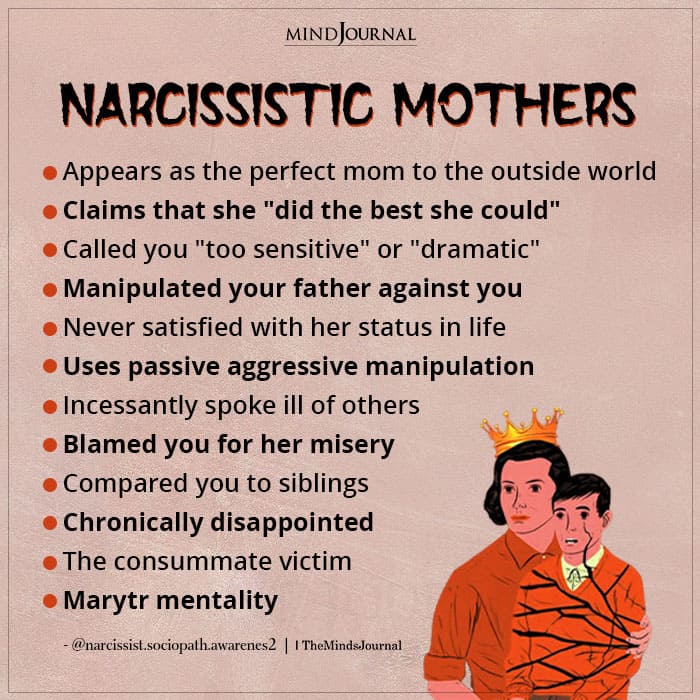
2. She severely lacks empathy.
You know you have a narcissistic personality disorder mother when she doesn’t even have an iota of empathy and kindness in her.
Empathy means trying to understand the feelings of someone by putting yourself in their shoes. Unfortunately, a covert narcissist mother tends to struggle with empathy, as her focus is primarily on her own needs and desires. As a result, she has difficulty understanding and validating her children’s emotions.
She may dismiss your feelings or downplay their significance, which can leave you feeling invalidated and emotionally neglected. This lack of empathy can have a significant impact on a child’s emotional development and ability to form healthy relationships in the future.
Related: 8 Horrible Ways A Covert Narcissist Mother Affects Her Children
3. She uses guilt and manipulation.
One of the biggest narcissistic mother traits is this.
They often employ guilt and manipulation as tactics to exert control over their children. She makes her children feel responsible for her happiness or uses emotional blackmail to get what she wants.
This can have long-lasting negative effects, as you may experience a sense of obligation and guilt that can be challenging to overcome. Feeling responsible for your mother’s happiness can create a heavy burden on you, and can lead to you sacrificing your own needs to meet your mother’s expectations.
The use of manipulation and guilt in this way can also harm your sense of self-worth and make it difficult for you to develop healthy boundaries in relationships.
4. She is overly critical.
She often displays a tendency to be excessively critical of you, frequently finding fault with your behavior or appearance, and this is easily one of the major narcissistic mother symptoms. She may use criticism as a tool for control or to make you feel inferior. This can lead to significant emotional damage, including feelings of low self-esteem and a sense of inadequacy.
Being overly critical is one of the obvious signs your mom is a narcissistic person. The constant criticism from your mother may cause you to feel as though you can never do anything right, leading to a constant need for approval and validation. Over time, this can create a cycle of seeking external validation to feel good about yourself, which can be difficult to break without professional help.
Furthermore, persistent criticism can negatively impact your sense of self-worth and damage your ability to form healthy relationships.
5. She is dismissive of you and everything you do.
Narcissistic personality disorder mothers often exhibit dismissive behavior toward their children’s opinions and ideas. They may not take their children seriously, or they may ridicule them for their beliefs. This can have a negative impact on the child’s sense of self-worth and can lead to feelings of self-doubt and insecurity.
Children who grow up with a dismissive mother may have a hard time expressing themselves or standing up for their beliefs. They may also have difficulty forming healthy relationships, as they may struggle to trust their own judgment and opinions.
The lack of validation from your mother can leave you feeling unseen and unheard and may make you feel as though your thoughts and feelings don’t matter. As a result, you may struggle with a chronic lack of confidence and difficulty in asserting yourself in various areas of your life.
Related: Narcissistic Mother Empath Daughter: 7 Signs You Have The ‘Good’ Daughter Syndrome
6. She is controlling.
One of the major signs your mom is a narcissistic person is her extremely controlling nature. She is very controlling in the sense that she looks forward to wanting to have a say in every aspect of her children’s lives.
She will even try to micromanage your decisions and try her best to manipulate you into doing what she wants you to do. She might also try to live vicariously through you. This can lead to a lack of independence and autonomy for you, especially if she has been doing this to you since you were a kid.
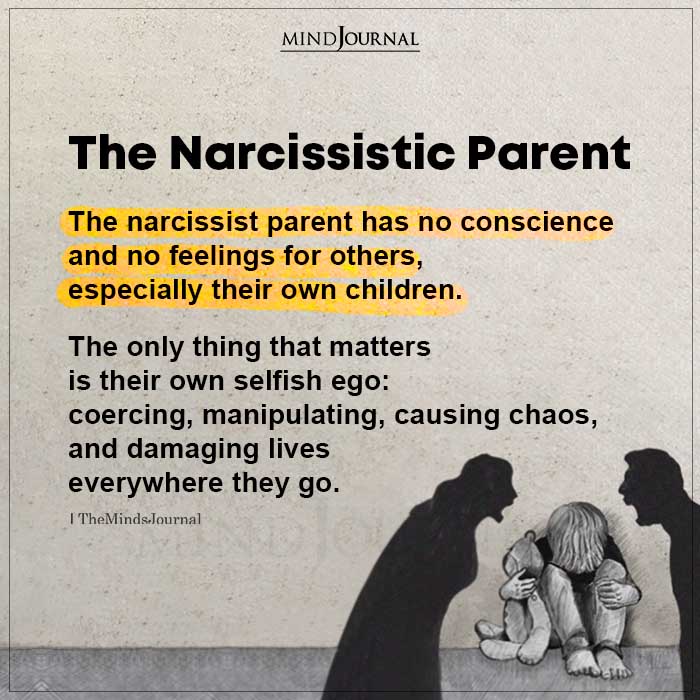
7. She lacks boundaries.
A narcissistic mother does not understand the concept of personal boundaries, and even if she does, she always chooses to ignore and disrespect them. She will always try to intrude on your boundaries, even if you have made them clear to her.
She does this because she sees her children as extensions of herself, and therefore feels entitled to invade your personal space or privacy. This can lead to a sense of violation and a lack of respect for your boundaries. Remember, this is also one of the significant narcissistic mother traits.
8. She can be really unpredictable and volatile.
She displays unpredictable behavior, leaving her children uncertain about what to expect from them. She may be loving and affectionate one moment and then become angry and resentful the next. This unpredictability can be challenging for you to navigate and can lead to feelings of instability and anxiety.
Children of narcissistic personality disorder mothers may feel as though they are walking on eggshells around their mother, never knowing when her mood might shift. The fear of not knowing what to expect can create significant stress and anxiety, which can harm a child’s emotional well-being.
Moreover, her volatile personality can make it challenging for you to develop a sense of trust and security in your relationships, as you may struggle to feel confident in your ability to gauge others’ behavior and emotions.
Related: Narcissistic Mother: 5 Signs Your Mother Is A Narcissist
9. She is extremely self-absorbed.
Narcissistic mothers have a pervasive pattern of self-absorption, where they prioritize their own needs and wants over everything else, including the well-being of their children.
As a result, these mothers may neglect their children’s basic needs such as food, shelter, and emotional support. She may also use you as props to enhance her own image or achieve her own goals, without considering your needs or feelings.
Children raised by a covert narcissist mother may feel abandoned, unloved, and emotionally neglected, leading to low self-esteem, depression, anxiety, and difficulty forming healthy relationships in the future.
Additionally, they may also struggle with setting healthy boundaries or asserting their own needs, as they have been conditioned to prioritize their mother’s needs over their own.
10. She treats you well, but only in public.
One of the major narcissistic mother symptoms, this is probably one of the worst and confusing things a child can go through or experience.
Narcissistic mothers can present a facade of being loving and caring in public, while behind closed doors they can be dismissive, cruel, or even neglectful. This behavior stems from a deep need to maintain a perfect image in front of others, rather than a genuine concern for their child’s well-being.
In public, the narcissistic mother may use you as a means to validate her own worth and boost her ego. She may brag about your accomplishments, belittle her own shortcomings as a parent, and seek praise and admiration from others.
This public display of affection naturally created confusion and doubt in your mind as a child, and you’ve struggled to reconcile your mother’s public persona with the private treatment you receive.
At home, she is emotionally unavailable, dismissive, or even abusive towards you. She may neglect your emotional needs, deny your feelings, or use you as a pawn in her own games. This inconsistent and manipulative behavior has always left you feeling unloved, unworthy, and powerless.
So, these are 10 narcissistic mother symptoms. Could you relate to it? Let us know in the comments. Meanwhile, you need to know one more important thing and that is your mother can also be an exhibitionist narcissist. Read on to know what is an exhibitionist narcissist.
Related: The Sons Of Narcissistic Mothers And The Damage They Endure
What Is An Exhibitionist Narcissist?
Exhibitionistic narcissism definition is this – an exhibitionist narcissist is someone who is always desperate for attention and admiration from others. They often engage in attention-seeking behaviors to feed their inflated sense of self-importance, such as dressing provocatively, talking loudly, or boasting about their accomplishments.
They may also go to great lengths to display their wealth, power, or attractiveness to others, seeking validation and adulation in return. This type of narcissist tends to be very charming and charismatic, using their charm and wit to manipulate and control others.
They tend to have a grandiose sense of self-importance because they believe that they are superior and better than others and that they always deserve special treatment.
Exhibitionist narcissists may also lack empathy and be dismissive of the feelings and needs of others, seeing them as inferior and unworthy of their attention. They may engage in risky or impulsive behavior to get attention and prove their superiority and may become angry or vindictive when they don’t receive the admiration they feel they deserve.
Overall, exhibitionist narcissists seek constant attention and validation from others, often at the expense of others’ feelings and needs. They may appear confident and successful on the surface, but their behavior often masks deep insecurities and a fragile sense of self-esteem.
Related: 7 Signs Your Mother Is An Exhibitionist Narcissist
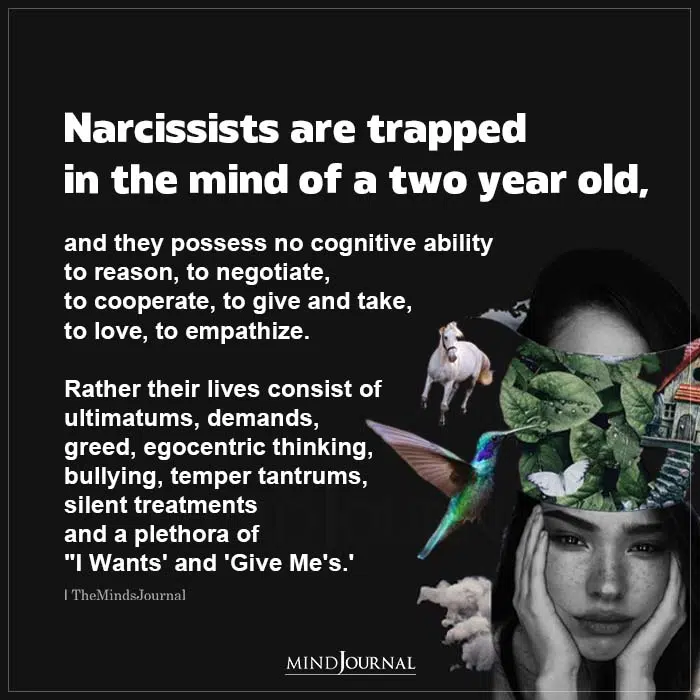
Conclusion
Growing up with a narcissistic mother can have a lasting impact on a child’s life. It can lead to a lack of self-esteem, a sense of inadequacy, and a tendency toward codependency.
It is important for children of narcissistic mothers to recognize the signs of narcissistic behavior and to seek support and help in dealing with it.
This may involve setting boundaries, seeking therapy, or even cutting ties with the narcissistic mother if necessary. Remember, you are not alone, and there is help available.
Have you noticed any narcissistic mother symptoms in your own mother? What was your childhood like? Let us know your thoughts in the comments down below!
Want to know more about the signs of a narcissistic mother? Check this video out below!
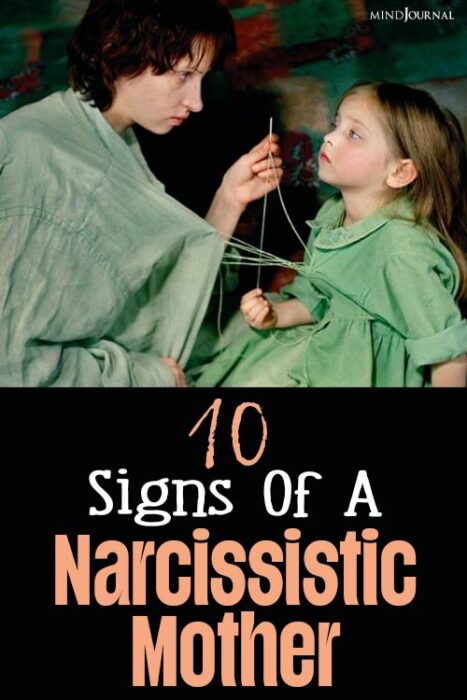
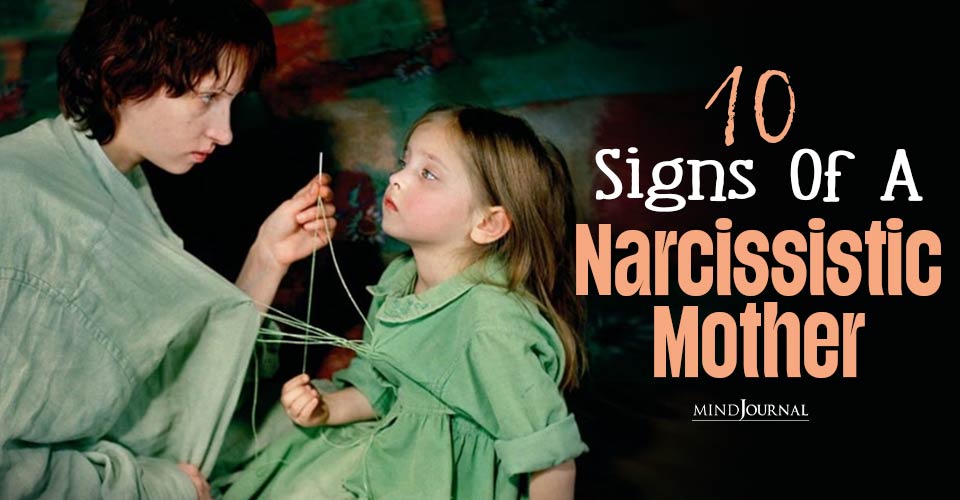







Leave a Reply
You must be logged in to post a comment.